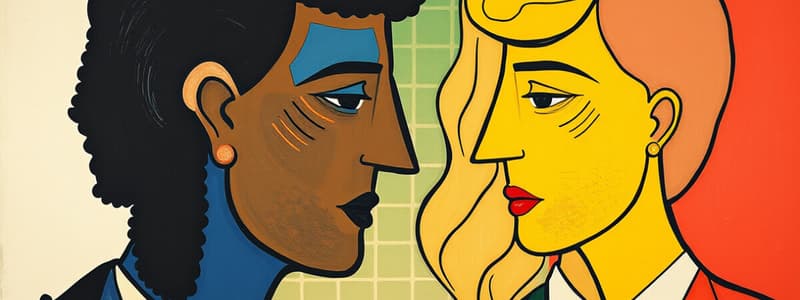Podcast
Questions and Answers
Which approaches are used to establish class positions?
Which approaches are used to establish class positions?
- Occupational status
- Bureaucratic authority
- Property relations
- All of the above (correct)
What do different sociologists consider for establishing class positions?
What do different sociologists consider for establishing class positions?
Occupational status, bureaucratic authority, property relations
What characterizes the upper class?
What characterizes the upper class?
- Extremely exclusive
- Majority of the population belongs to it
- Removed from the experience of most people
- A and B only (correct)
What is the most important aspect of the upper class?
What is the most important aspect of the upper class?
The upper class is considered a dominant ruling class.
The upper class is considered a dominant ruling class.
What does the power elite consist of?
What does the power elite consist of?
What are some means by which the upper class governs?
What are some means by which the upper class governs?
Match the following terms with their definitions:
Match the following terms with their definitions:
What influences the existence of the corporate class?
What influences the existence of the corporate class?
What does 'interlocking directorates' refer to?
What does 'interlocking directorates' refer to?
Flashcards are hidden until you start studying
Study Notes
Class Positions
- Class positions encompass upper, lower, corporate, middle, and working classes, utilizing different sociological criteria.
- Criteria include occupational status (Durkheim), bureaucratic authority (Weber), and property relations (Marx).
- Convergence of these influences affects individual rewards and life chances in contemporary societies.
Upper Class Characteristics
- Upper class members are often seen as exclusive and mysterious, removed from the experiences of the majority.
- Typically represent about 0.5% to 1% of the population, indicating high exclusivity.
- Wealth is characterized more by lineage and longevity than mere financial status, emphasizing lifestyle over celebrity recognition.
Social Institutions and Unity
- The upper class cultivates class consciousness through social institutions like private schools, exclusive resorts, and cultural events.
- Key families display generational wealth and maintain a sense of primary group solidarity.
Influence and Power Dynamics
- The upper class is involved in governance but is not viewed as a dominant ruling class.
- Governing mechanisms include economic power through ownership of production means and political power via participation, lobby efforts, and shaping policies.
Corporate Class
- Comprised of authority figures in major corporations, their power derives from controlling resources rather than personal wealth.
- Critiques suggest the upper class may not be a coherent group, with questions about unity and class consciousness.
Evolution of Influence
- Modern corporations have diminished the influence of traditional wealthy families, marking a shift toward a corporate class.
- The existence of the corporate class hinges on market dominance, stock control, and interlocking directorates among corporations.
Interlocking Directorates
- Interlocks reduce competition, facilitate information sharing, and unite corporate leaders in dealings with government.
- The inner group of the corporate class represents an elite subset, often linked to large banks and corporations.
Land and Political Economy in Hong Kong
- The Hong Kong government relies heavily on land sales for revenue, often leading to collaboration with property developers.
- Around 30% of government revenue is derived from land sales, reflecting significant economic stakes in real estate.
Theoretical Perspectives on Elites
- Functional Elite Theory posits that elites dominate due to their abilities, serving societal interests.
- Critical Elite Theory argues that elites act in self-interest, often harming lower classes.
Power Elite Concept
- Represents a small group controlling significant economic, political, and military power, distinct from the hereditary upper class.
- Class rule manifests through organizational structures rather than direct actions of upper class individuals.
Cultural Bourgeoisie
- Comprises intellectuals and professionals who control knowledge and skills, often pursuing individual interests and power within society.
Studying That Suits You
Use AI to generate personalized quizzes and flashcards to suit your learning preferences.



